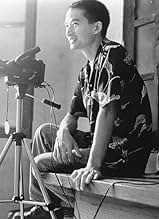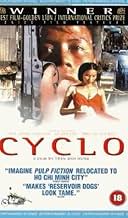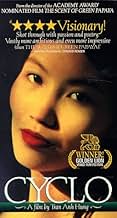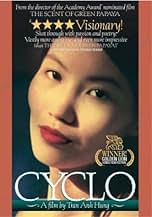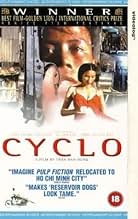NOTE IMDb
7,1/10
5,8 k
MA NOTE
Ajouter une intrigue dans votre langueWhen a poor bicycle-taxi driver has his cyclo stolen, he is forced into a life of crime. Meanwhile, his sister becomes a prostitute.When a poor bicycle-taxi driver has his cyclo stolen, he is forced into a life of crime. Meanwhile, his sister becomes a prostitute.When a poor bicycle-taxi driver has his cyclo stolen, he is forced into a life of crime. Meanwhile, his sister becomes a prostitute.
- Réalisation
- Scénario
- Casting principal
- Récompenses
- 4 victoires et 1 nomination au total
Tony Leung Chiu-wai
- Poet
- (as Tony Chiu Wai Leung)
Nu Yên-Khê Tran
- Sister
- (as Tran Nu Yên-Khê)
Thinh Trinh
- Foot Fetishist
- (as Trinh Thinh)
Avis à la une
Xich lo is a highly disturbing movie which manages to combine aspects of many cinematic traditions to make something new. It seems that the director held European cinematic and directorial traditions very high, and that is plainly visible in this movies. But the use of colours that somehow seem to move the soul can only be asian.
The humdrum of the city does not let up. The movie depicts a vicious cycle of abuse, extortion and violence. Le cyclo's attempt to get justice after his cyclo has been stolen is futile at first. Angry, he seeks help from le poete. This leads him into a spiral of violence, drugs and insanity. The fact that the actors do not have names, simply lables, such as "le cyclo," "le poete", and "le grand-pere," seem to reinforce the futileness of life in such conditions.
There is a strong undercurrent of frustration in this movie. Le poete, pimping out his girlfriend to fetishists whose pleasure does not come from the sexual act. He wants to keep her virtue for himself, but of course, this is folly. And even sadder is the le grand-pere, who is old, and sick, and yet, has to perform back breaking work to get by in life. Given a chance to earn some money, he rejects it, sticking by his principles. But ultimately, this does not get him anywhere.
So what is one to do? Being honest doesn't help you get anywhere. Neither does being a gangster. Or a madame. In the end, this is the question that remains unanswered...or to which there is no answer.
The humdrum of the city does not let up. The movie depicts a vicious cycle of abuse, extortion and violence. Le cyclo's attempt to get justice after his cyclo has been stolen is futile at first. Angry, he seeks help from le poete. This leads him into a spiral of violence, drugs and insanity. The fact that the actors do not have names, simply lables, such as "le cyclo," "le poete", and "le grand-pere," seem to reinforce the futileness of life in such conditions.
There is a strong undercurrent of frustration in this movie. Le poete, pimping out his girlfriend to fetishists whose pleasure does not come from the sexual act. He wants to keep her virtue for himself, but of course, this is folly. And even sadder is the le grand-pere, who is old, and sick, and yet, has to perform back breaking work to get by in life. Given a chance to earn some money, he rejects it, sticking by his principles. But ultimately, this does not get him anywhere.
So what is one to do? Being honest doesn't help you get anywhere. Neither does being a gangster. Or a madame. In the end, this is the question that remains unanswered...or to which there is no answer.
Sons lose their fathers, and miss their fathers. In Cyclo, the young man, who earns his living and supports his family by driving a rental cyclo (bicycle-taxi), is a child without parents. In Cyclo, the poet is a child that cannot be accepted by his father. In Cyclo, the retarded son of a widow is a symbol that by which the widow connects in spirit with his father, her dead lover. Under the tangle of missing, recollection of, and conflicting with fathers, Cyclo shows sons going through the shadow of fathers to rediscover themselves.
Father is a symbol of a family, that, when amplified, becomes a nation. In an article "no longer in a future heaven," the author McClintock mentions an idea: mother represents the history of a nation. However, in Cyclo, father (male) symbolizes the history and means where a son comes from. Leaving Vietnam since childhood, the director Tran is detached from Vietnam¡¦s history. But he still is a Vietnamese, because he comes from his father, a Vietnamese. However, to some degree, he is a child without father the history and memory of the Vietnamese past. To Tran, Vietnam, Ho Chi Minh City, and the people in there seem familiar, but are strange, actually. Maybe this can provide one reason as to why Tran uses the characters to spy on people in the streets of Ho Chi Minh City through the frames of windows or lenses. In some situations, spying means alienation-- an ambiguous mood about being eager for something but afraid to get close.
In my view, the women characters in Cyclo have two meanings. First, woman as mother is the one who protects the father's heritage. The widow is an example. She does her best to take care of her son, because in her mind, the son comes from his father and is a reflection of his father, even though he is retarded. The young man's sister, a virgin, represents the sacred image of a nation, which is cannot be invaded. Therefore, when she is assaulted, her man, the poet, rages to kill the attacker.
The characters in Cyclo do not have a name. However, this does not stop audiences to recognize them, or furthermore, to identify with them. Through gazing at their lives, behaviors, and psychological reactions, the young man could be you and me, and the poet could be anyone. They represent different types of people. The young man is a lost lamb. He at once identifies another father-image, the poet. But finally, he knows he is wrong. The poet represents contradictions. His present conflicts with the past (father), and his mentality clashes with his behaviors. If this film is allegorical of a collective loss of innocence of a nation, those characters reflect and depict Vietnamese situations from the director's point of view.
The end of the film shows the young man carrying his grandfather, elder sister and younger sister with a cyclo in a crowded street of Ho Chi Minh City. Sunshine brightly sprinkles on them, and they look very happy. The ending scene shows that through all the chaos, the young man finally rediscovers and re-builds himself in the present. Separated from the past, a son can still live well. Maybe to the Vietnamese, past is past; what is important is the present and future. To Tran, what is important is self-identified.
This is a movie that I strongly recommend.
Father is a symbol of a family, that, when amplified, becomes a nation. In an article "no longer in a future heaven," the author McClintock mentions an idea: mother represents the history of a nation. However, in Cyclo, father (male) symbolizes the history and means where a son comes from. Leaving Vietnam since childhood, the director Tran is detached from Vietnam¡¦s history. But he still is a Vietnamese, because he comes from his father, a Vietnamese. However, to some degree, he is a child without father the history and memory of the Vietnamese past. To Tran, Vietnam, Ho Chi Minh City, and the people in there seem familiar, but are strange, actually. Maybe this can provide one reason as to why Tran uses the characters to spy on people in the streets of Ho Chi Minh City through the frames of windows or lenses. In some situations, spying means alienation-- an ambiguous mood about being eager for something but afraid to get close.
In my view, the women characters in Cyclo have two meanings. First, woman as mother is the one who protects the father's heritage. The widow is an example. She does her best to take care of her son, because in her mind, the son comes from his father and is a reflection of his father, even though he is retarded. The young man's sister, a virgin, represents the sacred image of a nation, which is cannot be invaded. Therefore, when she is assaulted, her man, the poet, rages to kill the attacker.
The characters in Cyclo do not have a name. However, this does not stop audiences to recognize them, or furthermore, to identify with them. Through gazing at their lives, behaviors, and psychological reactions, the young man could be you and me, and the poet could be anyone. They represent different types of people. The young man is a lost lamb. He at once identifies another father-image, the poet. But finally, he knows he is wrong. The poet represents contradictions. His present conflicts with the past (father), and his mentality clashes with his behaviors. If this film is allegorical of a collective loss of innocence of a nation, those characters reflect and depict Vietnamese situations from the director's point of view.
The end of the film shows the young man carrying his grandfather, elder sister and younger sister with a cyclo in a crowded street of Ho Chi Minh City. Sunshine brightly sprinkles on them, and they look very happy. The ending scene shows that through all the chaos, the young man finally rediscovers and re-builds himself in the present. Separated from the past, a son can still live well. Maybe to the Vietnamese, past is past; what is important is the present and future. To Tran, what is important is self-identified.
This is a movie that I strongly recommend.
"Cyclo" is one of the greatest independent movies ever made. Vietnamese Auteur Tran Anh Hung shows how by accident violence becomes dominant in the life of a poor, young worker toiling in the streets of Saigon. Brilliantly shot with sometimes shocking and very intimate close-ups of violence and perversion, this movie deserves more attention. Besides "Cyclo" is also a documentary about the sad daily street life in giant third world cities and the permanent fight to survive.
8=G=
"Cyclo" tells of an impoverished Saigon family whose son (Cyclo) turns to crime and whose daughter turns to prostitution as a matter of economic survival. A magnificent accomplishment in cinematography, there's little new to be found in the film's somewhat muddled story which is told almost exclusively with the camera as Oscar winning director Anh Hung Tran demonstrates mastery over the lens in delivering this tapestry of pictures which captures the beauty and blight of a bustling Vietnamese city. Not for everyone, "Cyclo" will play best with those who appreciate true artistry in film.
The camera-work in this film is unbelievable. I haven't seen many films from Vietnam but this one is undoubtedly the best. Cinematography is top notch. Some of the photography is mind-boggling. Xich lo is about a young bicycle taxi driver from a poor family who becomes involved in gang activities after his taxi is stolen and his options are limited. The 123 minutes of the film give time for good character development. The gang's lieutenant, Poet, is a ruthless criminal who rarely speaks and is troubled his bad childhood and a recurring nosebleed problem. Madame is the wise leader with a retarded son, Fishmouth. Every character in the story is human, each with their own problems. I am not familiar with the filmmakers' other works so I don't know if there are any political or social messages contained in this film, but one shot of a wealthy, clean development late in the film is shown in sharp contrast to the dirty and violent world that we see in the rest of the film.
My only criticism of this is the pace.. it dragged slightly at a few points, and these seemed to be included in the final cut for the poetry and songs contained in them. I give this film a 10 in the end. Highly recommended.
My only criticism of this is the pace.. it dragged slightly at a few points, and these seemed to be included in the final cut for the poetry and songs contained in them. I give this film a 10 in the end. Highly recommended.
Le saviez-vous
- AnecdotesMade and banned in Vietnam. Criticised as too 'westernised' in its gritty and unrelenting portrayal of urban poverty in the country. The film has nevertheless received international acclaim, winning the Golden Lion Award in Venice in 1995.
- ConnexionsReferenced in Dog Park (1998)
- Bandes originalesCreep
Written by Albert Hammond, Mike Hazlewood, Thom Yorke, Jonny Greenwood, Colin Greenwood, Ed O'Brien and Phil Selway
Performed by Radiohead
Meilleurs choix
Connectez-vous pour évaluer et suivre la liste de favoris afin de recevoir des recommandations personnalisées
- How long is Cyclo?Alimenté par Alexa
Détails
- Date de sortie
- Pays d’origine
- Site officiel
- Langue
- Aussi connu sous le nom de
- Xích Lô
- Lieux de tournage
- Sociétés de production
- Voir plus de crédits d'entreprise sur IMDbPro
Box-office
- Montant brut aux États-Unis et au Canada
- 284 692 $US
- Week-end de sortie aux États-Unis et au Canada
- 38 109 $US
- 4 août 1996
- Montant brut mondial
- 284 692 $US
Contribuer à cette page
Suggérer une modification ou ajouter du contenu manquant


